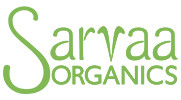Your Top Twelve Tactics for Avoiding Toxins
Posted by Derek Van Atta, Founder of Sarvaa Superfood on 22nd Mar 2019
The "Stack Effect" of Chemicals is All Around You!
One of the biggest factors behind disease and what is preventing you from having excellent health is all the "micro-doses" of countless chemicals you are exposed to on a daily basis. From plastics to preservatives, you are literally surrounded!
You've seen the media reports, and you have read the recent studies detailing the long-term harm these toxins are having on you as they "stack" inside your system. You've felt the strange call of your intuition when exposing yourself to paints, solvents, cleaning supplies, and other common household products - But, what can you do about it? What things can you shift in your life, today - right now - to "unstack" this toxic build up?
Here is what you can do to instantaneously shift yourself to cleaner living:
- Your Food is Medicine! Eat a diet focused on fresh, and organic whole foods. When you can't buy organic, at least avoid the "Dirty Dozen." Eat Low on the Food Chain - plants, small fish like sardines or anchovies vs. larger fish-eating fish. Larger fish eat other fish and chemicals absorbed by the smaller prey "stack up" in them, accumulating and concentrating in their tissues. Heavy metals like mercury are one example of these toxins. Avoid processed foods. These foods are trouble, as there are chemicals in the food and the packaging.
- If you eat animal products, be sure to choose 100% organic, grass-fed, sustainably raised meats and dairy to reduce your exposure to hormones, pesticides and fertilizers. Avoid milk and other dairy products that contain the genetically engineered recombinant bovine growth hormone (rBGH or rBST).
- Switch over to organic toiletries. Including shampoo, toothpaste, antiperspirants, and cosmetics. EWG’s Skin Deep database can help you find personal care products that are free of phthalates and other potentially dangerous chemicals. Replace feminine hygiene products (tampons and sanitary pads) with safer alternatives. Only buy sunscreen that does not contain chemicals such as oxybenzone, homosalate, octinoxate or other ingredients you can’t pronounce.
- Rather than eating conventional or farm-raised fish, which are often heavily contaminated with PCBs and mercury, use supplements such as a high-quality krill oil, or eat fish that is wild-caught and at little risk of contamination, such as wild-caught Alaskan salmon, anchovies and sardines.
- Avoid Restaurants. 99% of restaurant food is not organic, has GMO ingredients, and contains residual pesticides, herbicides, and heavy-metals.
- Buy products that come in glass bottles rather than plastic or cans, as chemicals can leach out of plastics (and plastic can linings) into the contents; be aware that even “BPA-free” plastics typically leach endocrine-disrupting chemicals that are just as bad for you as BPA. Store your food and beverages in glass, rather than plastic, and avoid using plastic wrap. Use glass baby bottles.
- Replace your non-stick pots and pans with ceramic or glass cookware. Replace your Teflon pans with cast iron or stainless steel pans.
- Filter your tap water for both drinking and bathing. Either way the water enters your body brings with it the toxins it contains, and your skin readily absorbs these contaminants. Most tap water toxins, including fluoride, can be filtered out using a reverse osmosis filter.
- Look for products made by companies that are Earth-friendly, animal-friendly, sustainable, certified organic, and GMO-free. This applies to everything from food and personal care products to building materials, carpeting, paint, baby items, furniture, mattresses to avoid toxins such as perfluorinated chemicals (PFCs).
- Make sure your baby's toys are BPA-free, such as pacifiers, teething rings and anything your child may be prone to suck or chew on — even books, which are often plasticized. It’s advisable to avoid all plastic, especially flexible varieties.
- Use natural cleaning products or make your own. Avoid those containing 2-butoxyethanol (EGBE) and methoxydiglycol (DEGME) — two toxic glycol ethers that can compromise your fertility and cause fetal harm. Use a vacuum cleaner with a HEPA filter to remove contaminated house dust. This is one of the major routes of exposure to flame-retardant chemicals.
- Look for fragrance-free products. One artificial fragrance can contain hundreds — even thousands — of potentially toxic chemicals. Avoid fabric softeners and dryer sheets, which contain a mishmash of synthetic chemicals and fragrances.
